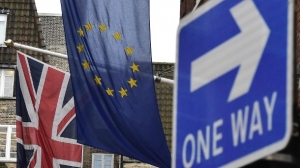UK PM Strikes Deal Over Special EU Status, Possible Brexit Looms
LONDON – UK Prime Minister David Cameron emerged from marathon negotiations in Brussels last week with a deal that gives Britain an unparalleled amount of autonomy within the European Union.
Cameron walked into the negotiations with a bevy of demands and came away with promises, but not legally binding agreements, from other members of the world’s most powerful economic bloc.
The drawn-out continuous talks with sceptical continental EU members ended with several concessions from Brussels that would keep the UK out of the EU’s doctrine of ‘ever closer union’, allow it and other non-Eurozone countries to trigger debates over European economic policy and an immediate seven-year moratorium on in-work benefits for EU citizens residing in the United Kingdom.
Cameron faces a stiff uphill battle as he attempts to sell the package of agreements to the British public in the race towards a June 23referendum on Britain remaining a constituent part of the EU.
Opponents who advocate for the UK to leave – a so-called ‘Brexit’ – argue that the European court of justice could overrule Cameron’s EU deal.
Downing Street steadfastly claims the agreements are legally binding and can be only overturned with the full consent of the British government.
Opposition to Britain’s continued membership in the bloc is led not by the opposition Labour Party and its resolute leftist leader Jeremy Corbyn, but by Cameron’s own Conservative Party, with London’s flamboyant Tory mayor Boris Johnson leading the ‘No’ campaign.
Cameron and his supporters – including the top brass in the military – warn that leaving the European Union could hinder the UK’s ability to deal with global threats including Vladimir Putin’s Russia and the Islamic State.
Britain’s business community has warned that a Brexit would severely harm the UK’s position as a global financial center, isolate the country from its lucrative trade with the EU and diminish the pound sterling’s privileged position on the global currency market.
Further compounding the problem, nationalists in Scotland – who were trounced in a September 2014 referendum on the country’s independence – have said a Brexit would immediately trigger a new drive to dissolve the United Kingdom.
Johnson, one of the country’s most popular politicians, and the No camp argue a Brexit would restore Britain’s historic sovereignty and democratic accountability for governmental decisions. Both deeply rooted institutions that many in the country believe have been compromised by the bureaucratic nature of a Britain-skeptic European Parliament.
The No’s can point to widespread support for Britain opting out of its EU membership. Recent polls have shown that roughly half of the voting public has a viscerally negative view of the European Union.
Cameron has called the impending referendum a watershed moment in recent UK history. The question for British voters this coming June will be whether they see the country’s future through the prism of imperfect 21st century cooperation or 20th century isolationist sovereignty.
Nicholas Waller












